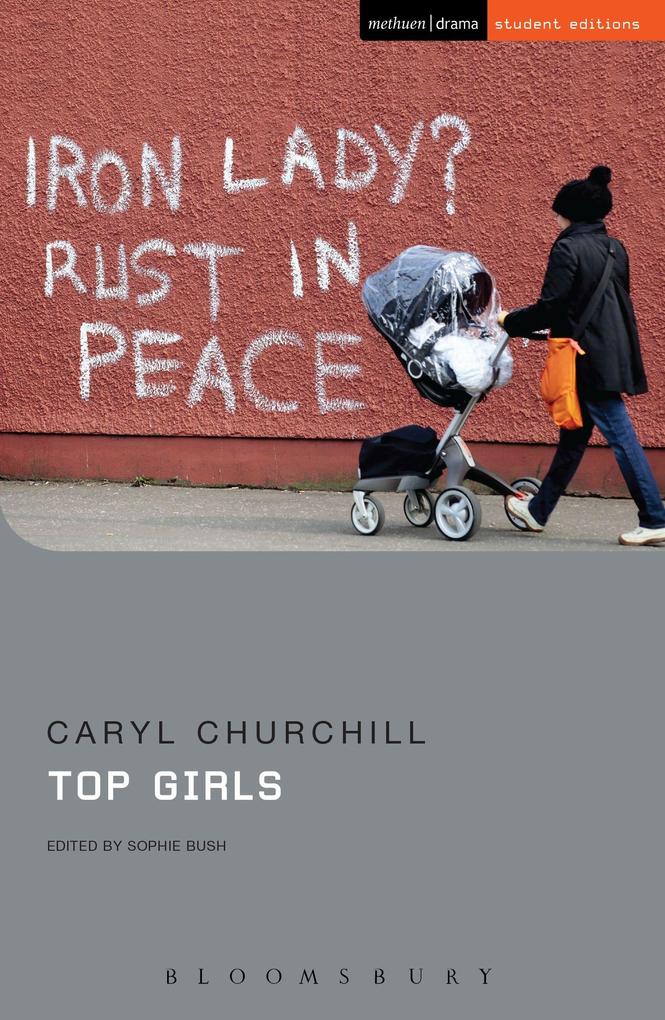
Zustellung: Di, 31.12. - Fr, 03.01.25
Sofort lieferbar
VersandkostenfreiBestellen & in Filiale abholen:
Top Girls questions the notions of 'success' when it comes to women's identities and priorities, and offers a striking look at the society and politics of the 1980s, dominated by the presence of the Prime Minister Margaret Thatcher, and the effects on everyday lives and, in particular, the lives of women.
Marlene thinks the eighties are going to be stupendous. Her sister Joyce has her doubts. Her daughter Angie is just frightened.Since its premiere in 1982, Top Girls has become a seminal play of the modern theatre. Set during a period of British politics dominated by the presence of the newly elected Prime Minister Margaret Thatcher, Churchill's play prompts us to question our notions of women's success and solidarity. Its sharp look at the society and politics of the 1980s is combined with a timeless examination of women's choices and restrictions regarding career and family.This new Student Edition features an introduction by Sophie Bush, Senior Lecturer at Sheffield Hallam University, UK prepared with the contemporary student in mind.METHUEN DRAMA STUDENT EDITIONS are expertly annotated texts of a wide range of plays from the modern and classic repertoires. A well as the complete text of the play itself, this volume contains:· A chronology of the play and the playwright's life and work· an introductory discussion of the social, political, cultural and economic context in which the play was originally conceived and created· a succinct overview of the creation processes followed and subsequent performance history of the piece· an analysis of, and commentary on, some of the major themes and specific issues addressed by the text· a bibliography of suggested primary and secondary materials for further study.
Inhaltsverzeichnis
Chronology (Churchill's life and work, alongside significant political, social and cultural events)
Contexts
* Historical contexts (women's rights/advancement; Thatcher's Britain)
* Theatrical contexts (The Royal Court; Max Stafford Clark; production history; critical responses)
* The play today (an interview with David Shirley, director of the play in 2014)
Themes
* Women and work
* Female Genealogy: Mothers and daughters (killing your mother; giving up your daughter); sisters (and sisterhood); 'Herstory'/re-finding women's histories
* Women's ability/freedom to occupy multiple/conflicting roles
* Women aping masculine behaviour/dress/passing as men
* 'Getting away'/freedom/travel/social mobility
* Class (individualism vs socialism; economic/social mobility; materialism vs human compassion; 'successful' women ignoring the plight of less fortunate women)
Dramatic Technique
* Language
* Structure
* Characterisation/multi-roling
Academic Debate (including suggestions for further reading)
Related Work
Play Text (with on-page glossing/notes)
Glossary of Dramatic Terms
Contexts
* Historical contexts (women's rights/advancement; Thatcher's Britain)
* Theatrical contexts (The Royal Court; Max Stafford Clark; production history; critical responses)
* The play today (an interview with David Shirley, director of the play in 2014)
Themes
* Women and work
* Female Genealogy: Mothers and daughters (killing your mother; giving up your daughter); sisters (and sisterhood); 'Herstory'/re-finding women's histories
* Women's ability/freedom to occupy multiple/conflicting roles
* Women aping masculine behaviour/dress/passing as men
* 'Getting away'/freedom/travel/social mobility
* Class (individualism vs socialism; economic/social mobility; materialism vs human compassion; 'successful' women ignoring the plight of less fortunate women)
Dramatic Technique
* Language
* Structure
* Characterisation/multi-roling
Academic Debate (including suggestions for further reading)
Related Work
Play Text (with on-page glossing/notes)
Glossary of Dramatic Terms
Mehr aus dieser Reihe
Produktdetails
Erscheinungsdatum
22. Februar 2018
Sprache
englisch
Auflage
2. Auflage
Seitenanzahl
XI
Reihe
Methuen Student Editions
Autor/Autorin
Caryl Churchill
Herausgegeben von
Sophie Bush
Verlag/Hersteller
Produktart
kartoniert
Gewicht
151 g
Größe (L/B/H)
198/130/15 mm
ISBN
9781350028579
Entdecken Sie mehr
Pressestimmen
Top Girls has a combination of directness and complexity, which keeps you both emotionally and intellectually alert. You can smell life, and at the same time, feel locked in an argument with an agile and passionate mind. John Peter Sunday Times
Bewertungen
0 Bewertungen
Es wurden noch keine Bewertungen abgegeben. Schreiben Sie die erste Bewertung zu "Top Girls. Student Edition" und helfen Sie damit anderen bei der Kaufentscheidung.


































